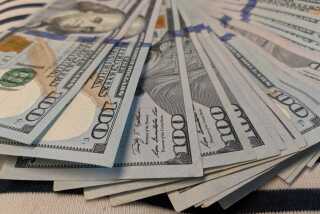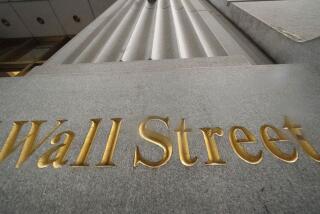Rising Rates Give Boost to Dollar
- Share via
Expectations of higher U.S. interest rates are driving the dollar up against two of its major rivals, the yen and the euro. That is hurting U.S. investors’ returns on Japanese and European stocks.
But the buck remains a relative weakling against many other currencies, including the Canadian dollar, the Mexican peso and the Brazilian real.
On Tuesday the dollar rose to a 16-month high against the yen and hovered near its best level against the euro since early July.
The U.S. currency ended in New York at 114.30 yen, up from 114.20 on Monday and the highest since May 2004. On Jan. 1 the dollar bought 103 yen.
The euro’s value inched up to $1.192 on Tuesday from $1.191 on Monday, but the European currency has mostly been declining since reaching a record $1.364 at the end of last year.
The U.S. economy’s resilience since Hurricane Katrina hit the Gulf Coast has boosted expectations that the Federal Reserve will continue to tighten credit, pushing interest rates up.
Yields on shorter-term Treasury securities have reached four-year highs in recent days, and longer-term bond yields also have jumped.
“The Fed is signaling that they’re not going to pause and they’re going to keep raising rates,” said Mitul Kotecha, head of currency strategy in London at Calyon, the securities unit of Credit Agricole. “It’s very supportive for the U.S. dollar.”
Higher U.S. rates mean many global investors are likely to favor U.S. bonds over lower-yielding bonds in Europe and Japan. That should keep money flowing into American bonds and thus into dollars, analysts say.
The yield on the 10-year Treasury note was at 4.37% on Tuesday. By contrast, 10-year German government bonds pay 3.19%. Japanese government 10-year bonds pay 1.57%.
Bond yields have jumped in Japan in recent weeks on more signs of strength in the Japanese economy. But because foreign bonds still pay so much more, Japanese investors remain big buyers of foreign issues, which sends capital out of Japan and weakens the yen.
Economic optimism also has lifted Japanese share prices sharply since spring. But the yen’s weakness has limited the gains for U.S. investors in Japanese stocks because yen translate into fewer dollars.
Over the last month Japan’s Nikkei-225 stock index is up about 8.8% in yen terms, but just 4% in dollar terms, according to Bloomberg News data.
The German DAX stock index is up 6.2% over the last month in euro terms, but it’s up a mere 1% in dollars.
It’s a different story in markets including Canada, Mexico and Brazil, where the dollar continues to decline against those countries’ currencies, in part because investors have high hopes for those economies.
The U.S. dollar is at its weakest level since 1992 against the Canadian dollar. One U.S. dollar buys about $1.17 Canadian, down from $1.27 in May.
More to Read
Inside the business of entertainment
The Wide Shot brings you news, analysis and insights on everything from streaming wars to production — and what it all means for the future.
You may occasionally receive promotional content from the Los Angeles Times.









